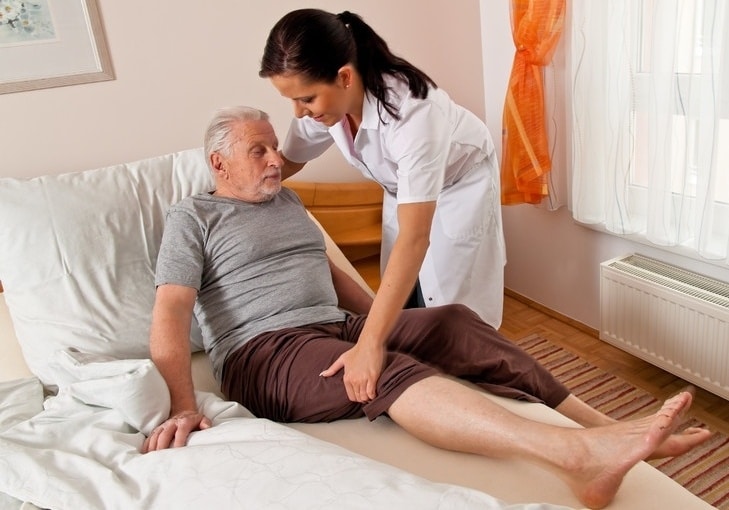Care for Nurses with Chronic Venous Insufficiency

It can hurt to care--just ask any nurse.
As a profession, nurses experience some of the highest rates of varicose veins and Chronic Venous Insufficiency (CVI) in the country. In fact, in one study by the NIH, 63 per cent of participating nurses were shown to have at least one sign of CVI.
Nurses will know that it is important to diligently practice self-care in order to minimize the discomfort of this condition. Elevating the legs, compression stockings, and engaging in calf muscle-contracting exercises such as walking are just some of the home care remedies that can provide occasional relief. As a chronic and progressive condition, the pain, fatigue and other symptoms caused by CVI are likely to worsen.
Fortunately, there are other minimally invasive treatment options that can bring relief from the pain of CVI and varicose veins. If you live and work with any of these symptoms , consider consulting a qualified vein specialist soon to ensure your vascular health is not at risk, and to learn about a treatment plan that is tailored for you.
In the meantime, compression stockings helps if you stand or sit for long periods of time. However, be careful with calf sleeves as they can sometimes cause swelling in the feet because they typically end at the ankle.
CVI risk factors for nurses
There are a number of reasons why nurses are at particular risk for development and progression of CVI. The first reason is their job requires that they stand for long periods; basically, gravity takes its toll. Activities that require standing (or even sitting) for extended periods deprive the body of the benefits of the strong calf muscle contractions produced while walking. This means the heart has to work a lot harder to push the blood through the legs and back up for reoxygenation and recirculation. Over time, the vascular system wearies and becomes less efficient.
The physical strain of the occupation is another notable contributor to the development of CVI. Nurses work long hours, carry out very physical labor, and often perform shift work. This can affect sleep and eating schedules, and these factors can have a negative effect on health, generally, leading to conditions such as insomnia and overweight.
Another factor is gender. Women dominate nursing, and estrogen, oral contraceptives and hormone replacements are known to contribute to the weakening of blood vessel walls. This stretch in blood vessels means more bulging and less efficient return of blood.
Help for nurses with CVI
The good news is that there are qualified vein specialists who care about the wellbeing of nurses. Jilanne Rose is one such specialist. As a board certified doctorate nurse practitioner, she understands the special needs of nurses. Trained by three top Arizona vein specialists-an interventional cardiologist, a cardiothoracic surgeon, and an interventional radiologist-she has completed over 10,000 peripheral vein procedures, and is known for her compassionate care and exceptional outcomes.
If you are experiencing any of the symptoms of CVI, consider consulting with Jilanne today to find out how she can have you back on your feet and doing the work you love, more comfortably, in remarkably little time.
Leg Cramps There are many reasons for muscle cramps. A lot of people experience them because of a deficiency of certain key elements such as potassium and magnesium. Others, particularly those that live in warmer climates such as Arizona, experience cramps due to dehydration. A large number of patients I consult, flat out do not…
Read MorePregunta: yo tenía EVLT por otro doctor de la vena y resolvió la mayor parte de mi dolor. Cuatro semanas después de que tuve escleroterapia con espuma, mi dolor regresó. En realidad, ha empeorado. Un mes post, me pongo 30-40 mm medias diarias, pero aún así me duele mucho. Veo a mi médico en un…
Read MorePregunta: el calcetín de compresión de rodilla alta está pellizcando la parte superior de mi rodilla y dejando marcas doloridas (muescas). Mi trabajo requiere que me quede todo el día. Tengo venas de araña en mis tobillos y en el costado de mi pantorrilla exterior. ¿Debo seguir gastando la media aunque sea incómodo?
Read MoreQuestion: I had EVLT by another vein doctor and it resolved most of my pain. Four weeks after I had foam sclerotherapy, my pain returned. Actually, it has worsened. One month post, I wear 30-40 mm stockings daily, but still I hurt SO much. I see my doctor in a month, any thoughts about what…
Read MoreQuestion: The knee-high compression sock is pinching the top of my knee and leaving sore marks (indentations). My job requires me to stand all day. I have spider veins in my ankles and on the side of my outer calf. Should I continue to wear the stocking even though it’s uncomfortable?
Read MoreQuestion: I went to a doctor in Glendale and finished all my Sclerotherapy injections and have had 2 EVLT (endovenous laser therapy) procedures, a vein ligation and a microphlebectomy for spider veins, all of which I wore 20-30 mmHg compression thigh-high hose for 2-3 weeks. After I had laser treatments on my legs, I was…
Read MoreQuestion: I live in Tucson, Arizona and had VenaSeal done by a doctor here. Should I have pain and swelling after my VenaSeal procedure was carried out? It was purported to be painless compared to radiofrequency ablation (RFA).
Read MoreQuestion: I don’t know who to turn to. I take Furosemide and it doesn’t seem to be helping as fast as it should be. Do I need to see a podiatrist or do I need to get a referral to go see a specialist? I’ve been off work for 2 and 1/2 months from total…
Read MoreQuestion: My wife has had multiple ultrasounds. One ultrasound tech found a bad perforator at 5mm, but they wanted to do open surgery. Another ultrasound tech from the Dr she wanted to use who does laser and RF could not find the perforator. What to do?
Read MoreCabbage not always an “Irish” food, but beneficial for varicose veins Whether you’re one of the 34.5 million Americans who claim Irish ancestry or not, celebrating Saint Patrick’s Day has some potential health benefits! When the Irish immigrated to the United States, they found beef brisket was inexpensive, and nutrient dense cabbage was affordable and…
Read More

